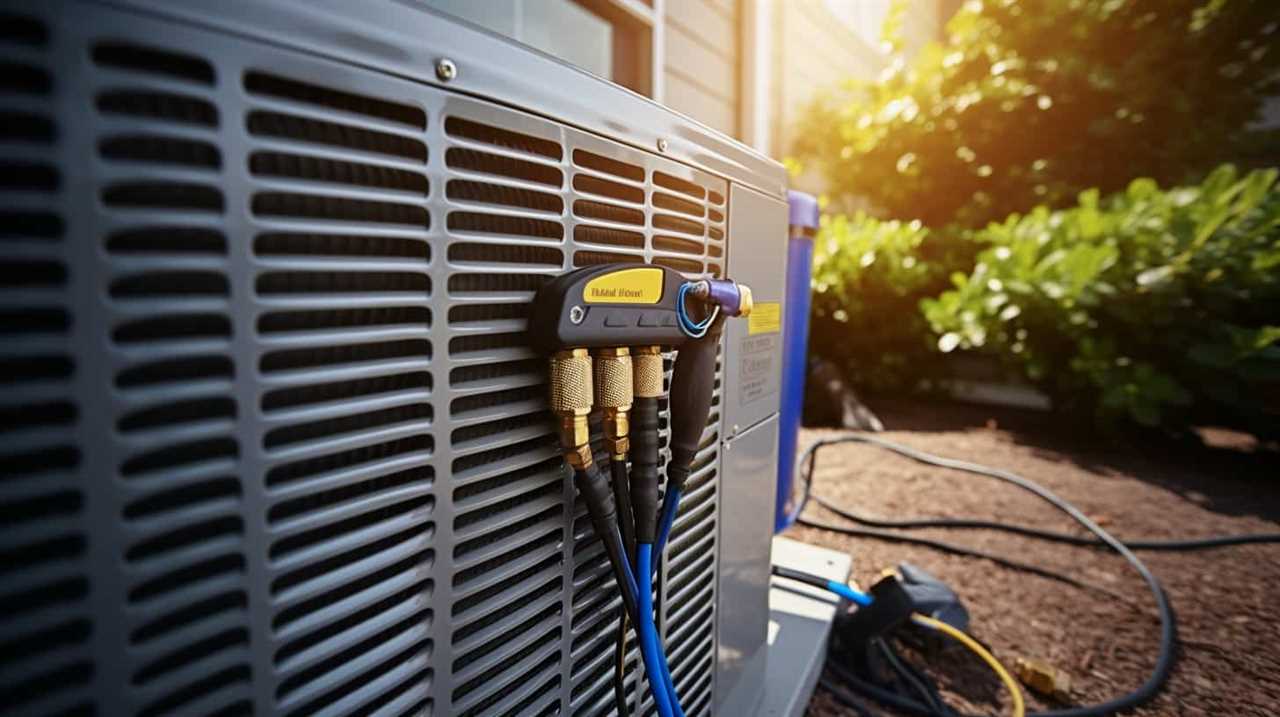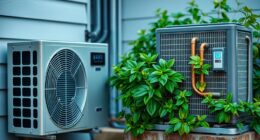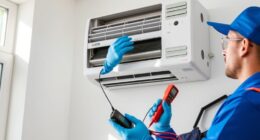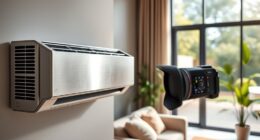Are you aware that optimizing your heat pump can lead to substantial energy savings for your home? By adjusting the settings correctly and keeping up with regular maintenance, you can enhance the efficiency of your heat pump and lower your energy bills.
In this article, we will explore how to choose the right size heat pump, optimize its settings, and explore advanced technologies to achieve maximum energy efficiency.
Get ready to unlock the full potential of your heat pump and enjoy the freedom of an energy-efficient home.
Key Takeaways
- Choosing the right size heat pump is crucial for optimal efficiency
- Adjusting temperature and airflow settings can lead to energy savings
- Regular maintenance is important for improved heat pump efficiency
- Exploring advanced heat pump technologies can maximize energy efficiency
Understanding Heat Pump Efficiency
Now, let’s delve into how we can understand heat pump efficiency.
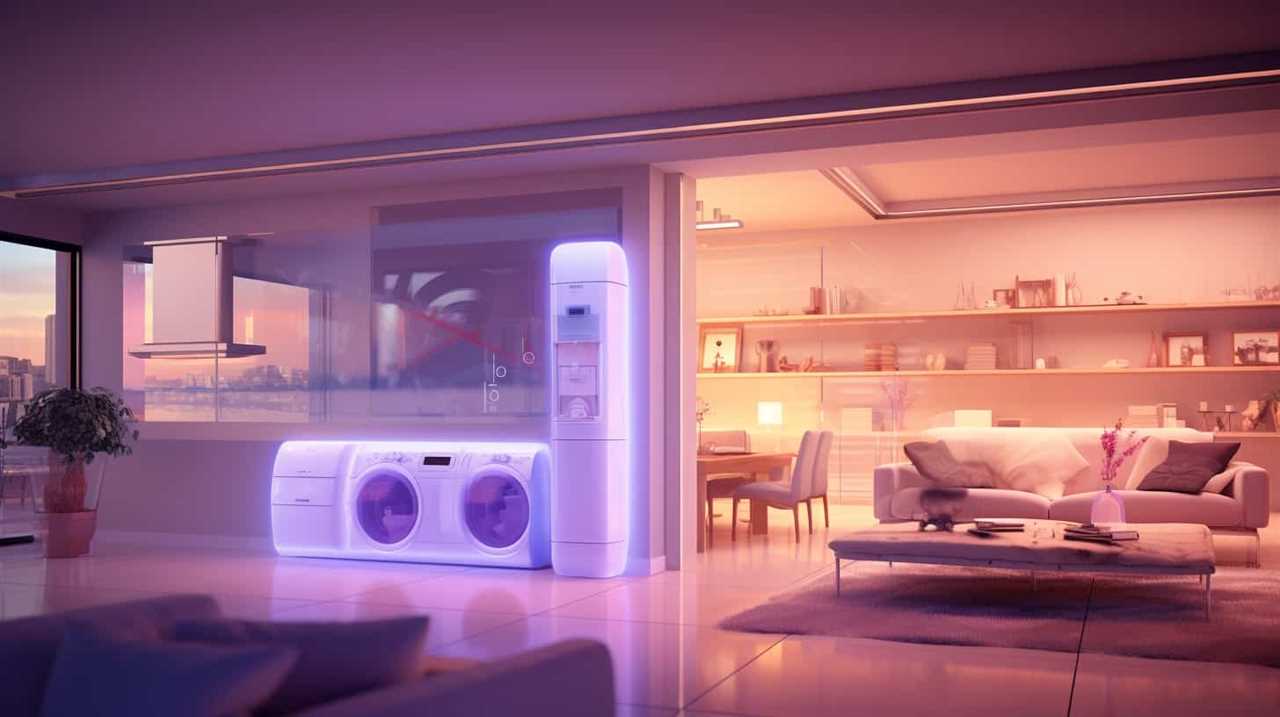
When it comes to heat pump installation, it’s crucial to consider the factors that can affect its efficiency.
One of the main factors is the size of the heat pump in relation to the space it will be heating or cooling. An undersized heat pump will struggle to meet the demand, leading to decreased efficiency. Conversely, an oversized heat pump will cycle on and off frequently, resulting in energy wastage.
Another important factor is the insulation of the building. Proper insulation ensures that the heat pump can operate efficiently by reducing heat loss or gain.
Additionally, the location of the heat pump’s outdoor unit can impact its efficiency. Placing it in a shaded area away from direct sunlight can prevent overheating and maintain optimal performance.
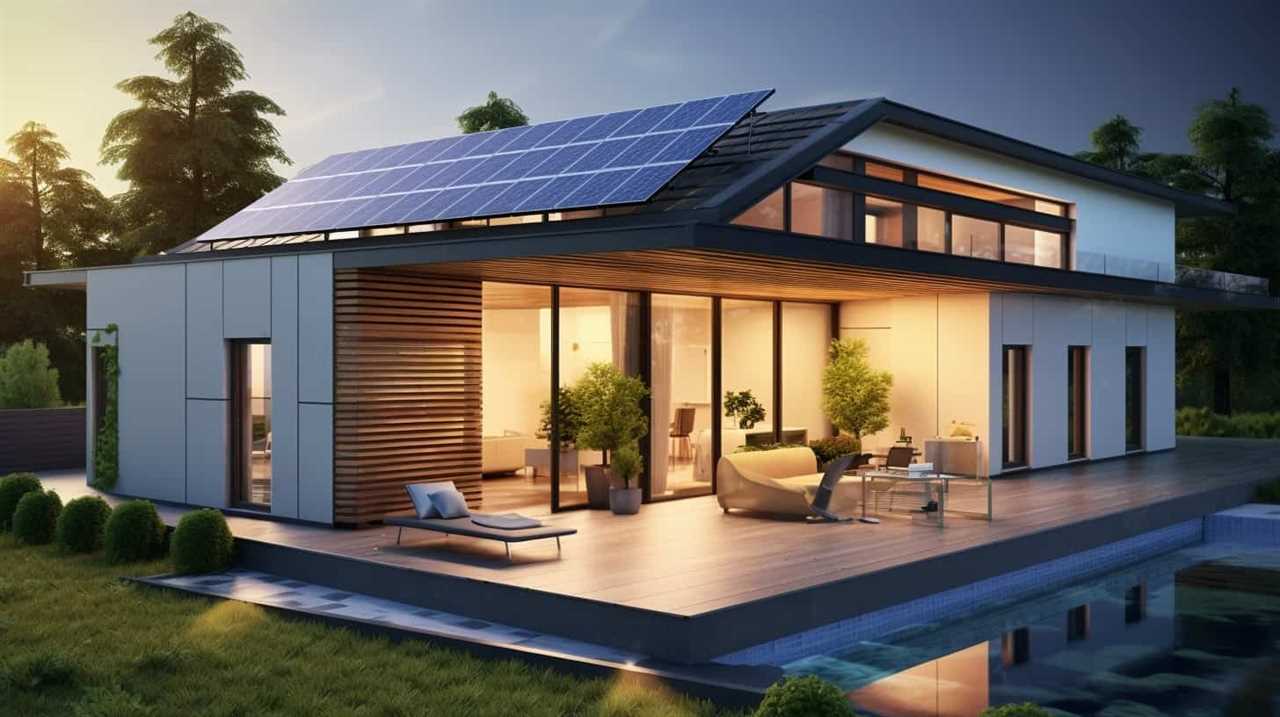
Choosing the Right Size Heat Pump for Your Home
To ensure optimal energy efficiency, we must carefully select and install the right size heat pump for our home. Choosing the correct size heat pump is crucial in maximizing its performance and minimizing energy waste.
Installing an undersized heat pump may result in inadequate heating or cooling, while an oversized one can lead to frequent cycling and reduced efficiency. It’s essential to consider factors such as the climate, insulation, and square footage of our home when determining the appropriate size.
Additionally, consulting with a professional can help us accurately assess our heating and cooling needs. Taking advantage of heat pump rebates can also make the installation more affordable.
Optimizing Heat Pump Settings for Energy Savings
We can maximize energy savings by adjusting and optimizing the settings of our heat pump. Here are four key factors to consider:

-
Heat pump temperature: Set the ideal temperature for your heat pump based on your comfort level and the outdoor temperature. Lowering the temperature in winter and raising it in summer can help reduce energy consumption.
-
Heat pump airflow: Ensure that the airflow is set correctly to achieve maximum efficiency. Proper airflow allows for better heat transfer and distribution, improving overall performance.
-
Thermostat programming: Take advantage of programmable thermostats to schedule temperature changes throughout the day. This way, you can adjust the settings based on when you’re home or away, optimizing energy usage.
-
Zone control: If your heat pump has zone control capabilities, utilize this feature to only heat or cool specific areas of your home. This allows for customized comfort and avoids wasting energy in unused spaces.

By optimizing these settings, we can achieve significant energy savings with our heat pump.
Now, let’s delve into regular maintenance tips for improved efficiency.
Regular Maintenance Tips for Improved Efficiency
To ensure improved efficiency, we should regularly maintain our heat pump. By following simple maintenance tips, we can reduce energy consumption and save on our utility bills. Here are some energy-saving tips for maintaining your heat pump:
| Maintenance Task | Frequency | Description |
|---|---|---|
| Clean or replace filters | Monthly | Dirty filters restrict airflow, reducing efficiency. |
| Check and clean outdoor unit | Annually | Remove debris and ensure proper airflow around the unit. |
| Inspect ductwork | Annually | Seal any leaks to prevent energy loss. |
| Lubricate moving parts | Annually | Lubricating the motor and fan ensures smooth operation. |
| Schedule professional maintenance | Bi-annually | A professional can inspect, clean, and tune your heat pump for optimal efficiency. |
Regular maintenance not only improves efficiency but also extends the lifespan of your heat pump. In the next section, we will explore advanced heat pump technologies for maximum energy efficiency.
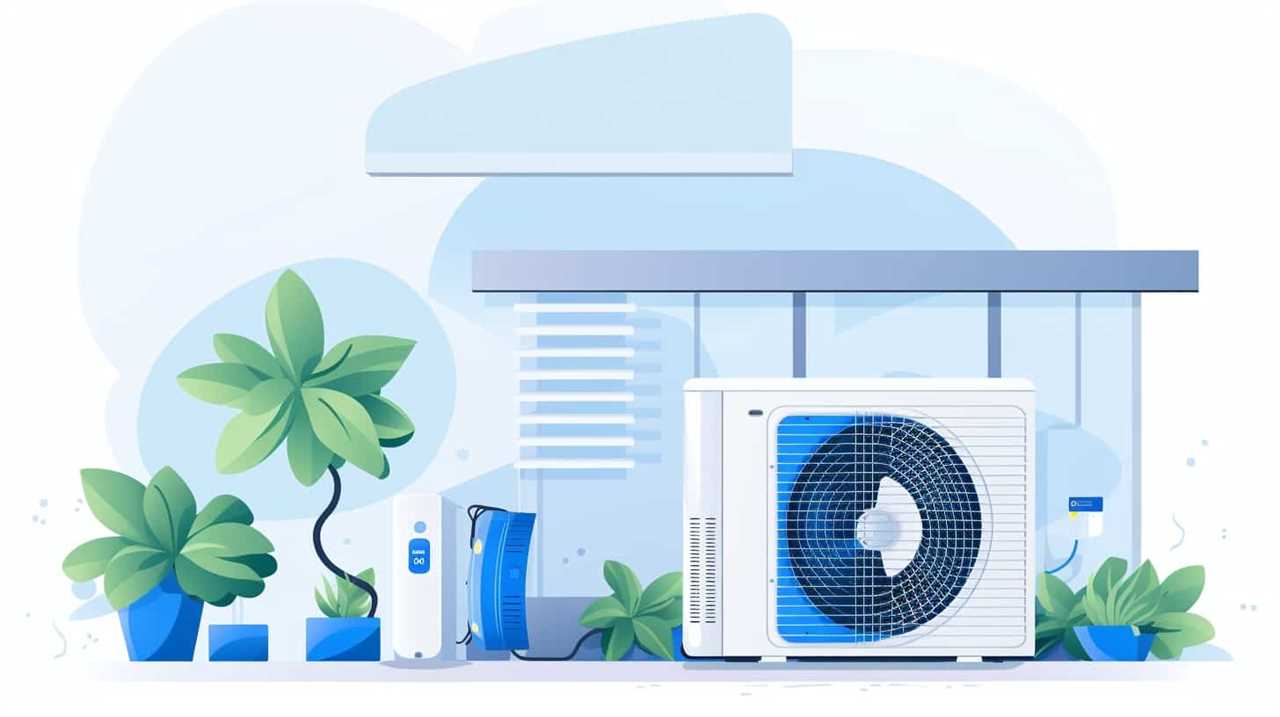
Exploring Advanced Heat Pump Technologies for Maximum Energy Efficiency
Let’s explore advanced heat pump technologies that can maximize energy efficiency. These heat pump innovations are designed to provide superior performance while minimizing energy consumption.
Here are four energy efficient heat pump designs that can help you unlock the full potential of your system:
-
Variable Speed Technology: Heat pumps equipped with variable speed compressors can adjust their speed based on the heating or cooling needs of your space. This allows for precise temperature control and reduces energy waste.
-
Enhanced Heat Exchangers: Advanced heat exchanger designs optimize the transfer of heat between the refrigerant and the air or water, increasing overall efficiency and reducing energy consumption.
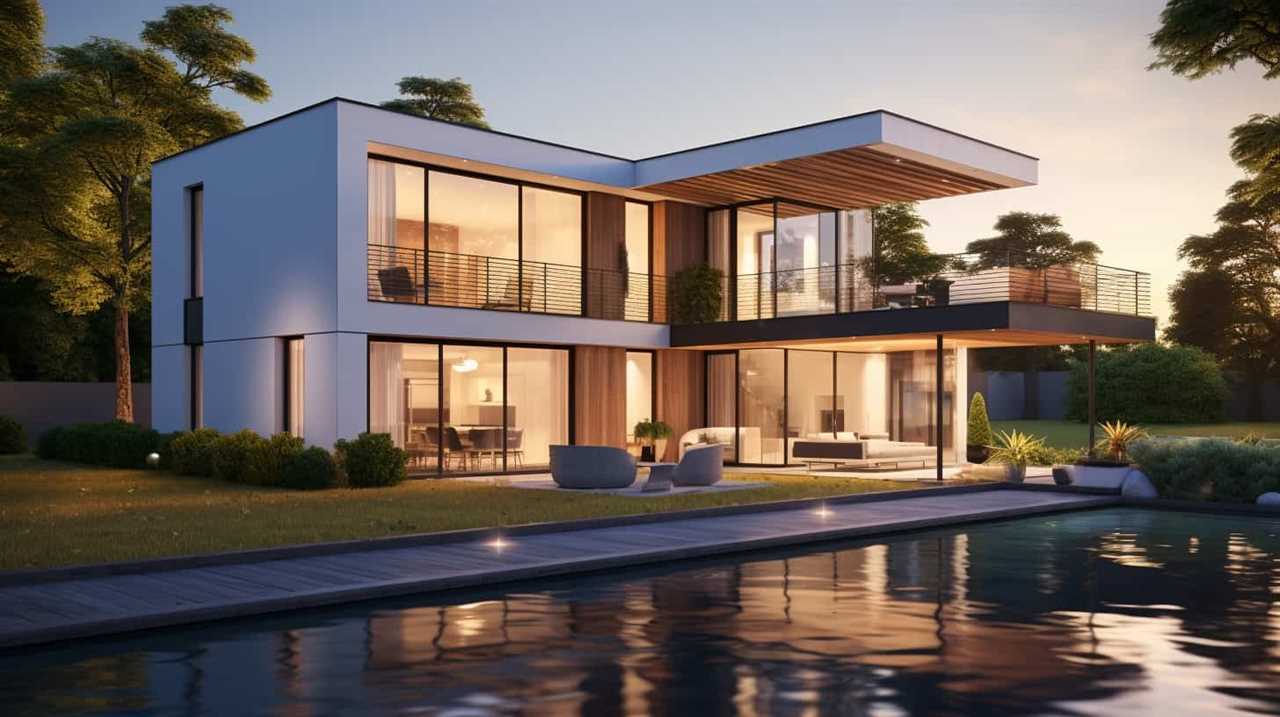
-
Smart Controls and Sensors: Integrating smart controls and sensors into heat pump systems enables them to adapt to changing conditions and optimize energy usage. These technologies can automatically adjust settings based on occupancy, weather conditions, and other factors, maximizing energy efficiency.
-
Geothermal Heat Pumps: Geothermal systems utilize the stable temperature of the earth to efficiently heat or cool your space. By tapping into the earth’s natural heat, these heat pumps can significantly reduce energy consumption and operating costs.
Frequently Asked Questions
Can I Install a Heat Pump in an Older Home With an Existing Heating System?
Yes, we can install a heat pump in an older home with an existing heating system. We will assess the compatibility of the two systems and make any necessary adjustments to ensure optimal performance and energy efficiency.
What Are the Potential Drawbacks of Using a Heat Pump for Heating and Cooling My Home?
Using a heat pump for heating and cooling your home has potential drawbacks. It may not be as efficient as other systems, and the initial cost can be high. However, it offers energy savings and the freedom to control your indoor comfort.
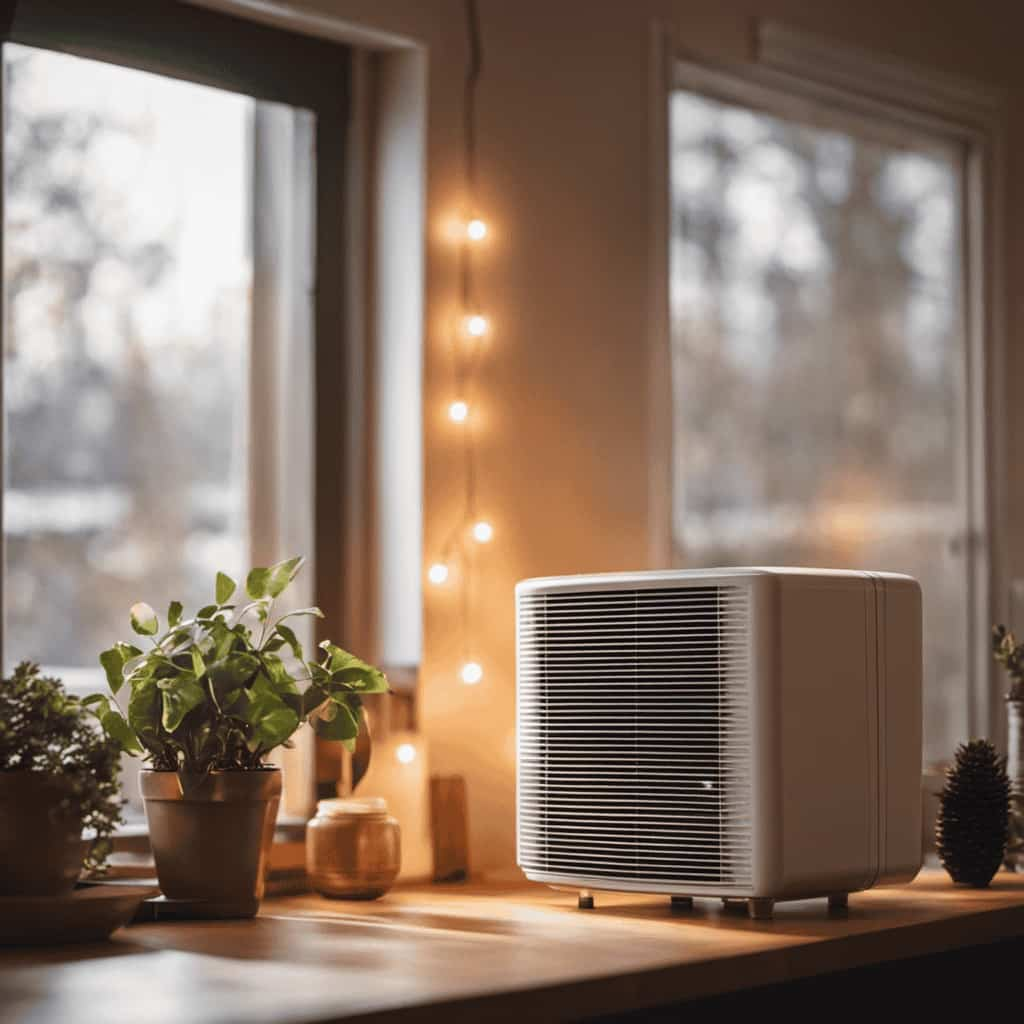
Are There Any Government Incentives or Rebates Available for Installing a Heat Pump?
There are government incentives and rebates available for installing a heat pump, which can greatly contribute to energy savings. These incentives aim to encourage the adoption of energy-efficient technologies and reduce carbon emissions.
How Long Does It Typically Take to Recoup the Cost of Installing a Heat Pump Through Energy Savings?
Typically, it takes a few years to recoup the cost of installing a heat pump through energy savings. Factors affecting heat pump payback include efficiency, climate, insulation, and usage patterns. Let’s unlock energy efficiency together!
Can a Heat Pump Be Used to Heat a Swimming Pool or Hot Tub?
A heat pump can be used to efficiently heat a swimming pool or hot tub. By optimizing heat pump efficiency, we can compare the cost of heating with other methods and determine the best option for energy savings.
Conclusion
In conclusion, unlocking energy efficiency with heat pump optimization is like discovering a hidden key that opens the door to a greener future. Just as a key symbolizes access and opportunity, optimizing heat pump settings and exploring advanced technologies symbolize our ability to unlock the full potential of energy efficiency.
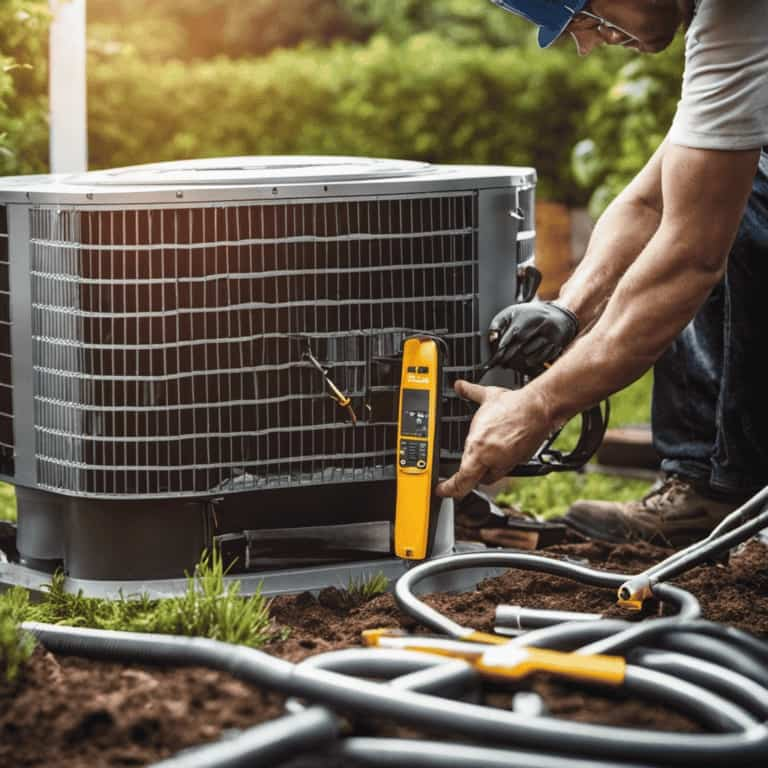
By choosing the right size heat pump, performing regular maintenance, and maximizing energy savings, we can pave the way towards a more sustainable and efficient world.
Let’s embrace this symbol of progress and make a lasting impact.


